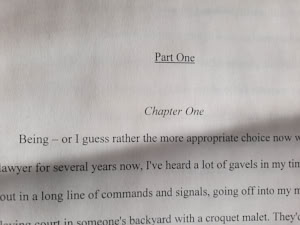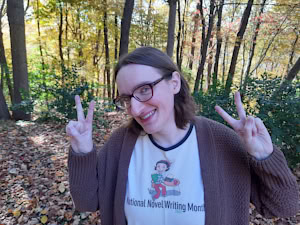November 1, 2022
Reflections on NaNoWriMo, 20 Years Later

Twenty years ago today, I wrote the first 2,000 words of my first NaNoWriMo novel.

I participated in NaNo from 2002-2007, and then again in 2012, as well as several personal “off-season” NaNoWriMo-inspired writing marathons. And though I don’t technically join anymore, it was such an influential part of my early writing life that it felt wrong not to mark this occasion.
So today, let’s take a look at the biggest lessons I gained from the experience—and how it continues to shape me as a writer even now.






5 Things NaNoWriMo Taught Me
1) How to write a novel
By the time I found NaNoWriMo, I’d been “writing novels” for a few years already, with little success. I had one old draft I’d abandoned several years earlier, when I realized the story was almost over and my manuscript was only sitting at 26 pages, and I had one work-in-progress that I’d been poking at for over a year without making much progress.
Then I heard about this crazy challenge called National Novel Writing Month, and I was immediately intrigued, inspired, and just a little intimidated. It sounded amazing, and I really wanted to prove I could do it, but there were a few problems:
- I was already in the middle of my novel, and didn’t want to start a new one just yet
- I was working in WordPerfect, and didn’t know how to view my document’s word count (or if the program even could)
- I had just missed the sign up window
That was in 2001, and so I did what any trailblazing NaNo rebel would do: I took the month of November as an excuse to write as much as I could, and finished up my current novel. A “dry run” NaNo, if you will, one to test the waters so that next year, I’d be ready.
What that first unofficial NaNo taught me is that this was something I genuinely could do—a fact backed up a year later, when I participated in NaNoWriMo for real, and then proved again and again as the years went by and the first drafts added up.
There was just one problem: as expected, those early books were pretty bad.
2) How to write a better novel
By the time 2006 rolled around, my writing was struggling. I was drafting a novel every November, sure, but my productive output was nearly zero for the rest of the year. On top of that, my books were severely underwritten, and none of my editing attempts were going anywhere.
There was a lot of soul searching that year, and a few times when I questioned if I would even continue with this whole “being a writer” thing—but then NaNoWriMo rolled back around, and I decided to challenge myself a little more: this time, I would finally learn how to write the kind of pacing and voice I’d been striving for. After all, if NaNoWriMo is good for anything, it’s good for teaching you how to write a lot of words in a short amount of time.
A common critique of NaNoWriMo is that writing fast always results in poor quality work. But for me, NaNoWriMo had always been an opportunity to practice a new skill. From learning how to finish a draft, to refining my voice, to playing with genres and styles and characters, each November was a chance to do something new, to grow and learn and play, to end the month a better writer than I was at the beginning.
And the thing is, it worked. Every single time, it worked. Because of lesson #3.
3) Words are cheap
Once I learned how to write fast, suddenly a whole world of possibility opened up.
For one, I stopped being so precious with each word/sentence/chapter/book. It’s not just freeing yourself up to write a messy first draft—visual arts (painting, sketching, etc.) have the concept of work being too “stiff,” and it’s a lesson I think we need to make more prevalent in the writing world. My best work is written when I’m relaxed, when I’m not worrying about exactly how I’m phrasing things, when I’m having fun with my work.
NaNoWriMo, at least the way I approached it, encouraged the sort of lightness and playfulness that, once I’d learned that habit, has served me better than any writing craft advice ever has.
But there’s also a practical side to this: because words are cheap, I am no longer afraid of making huge, structural changes. Why would I be, when I know I can write the new sections easily enough?
On a similar note, NaNoWriMo also taught me that…
4) There’s no book I can’t write
Often, I’ll hear writers express that there’s a book they really want to write, but they “know” they’re not “good enough” to do it justice—so they don’t write it. Maybe, eventually, one day, they’ll come back to it. But for now, they’ll write other books, learn more about their craft, improve their skills.
Writers, if this is you, I say this with all the love in the world: The only way you’ll learn how to write the book that intimidates you is to write the damn book.
Because I cut my writing teeth on NaNoWriMo, I had no preconceptions about what sort of work I was capable of—in other words, nothing to hold me back. So I wrote zany, imaginative, weird, and wildly ambitious books.
By the time I got a little older and my insecurities started catching up with me, I already knew I could write whatever I wanted. Yes, I might not get it right the first time around, but that was fine. Again, words are cheap, and what difference did it really make if I wrote a “bad” book? No one had to see it, and if I still believed in the story but flubbed the execution the first time around? Okay, I’d just write it again.
Wild overconfidence is kind of a staple to NaNoWriMo in my mind, and if you can manage to cultivate that, well… you’ll truly be unstoppable.
5) How my writing process works (and how it DOESN’T)
As wonderful as my experience with NaNo was, I eventually started feeling claustrophobic. So, in 2008, I made the hard choice to skip it.
The idea felt impossible at the time—NaNoWriMo, and my 6-year winning streak, had become such a big part of my identity as a writer. But I was in a weird spot: the format of the challenge was starting to chafe, but I was also feeling like 30-day writing marathons were the only way I could finish a draft, and honestly that was part of the problem.
As weird as it was to step back, though, it also came with a huge sense of relief. And if doing NaNoWriMo in 2002 was the best thing I’d ever done for my writing to date, then stepping back from it in 2008 was the second best.
Free of the expectations of the challenge, I was able to explore who I really was as a writer and what kind of conditions I needed to cultivate in order to do my best work. I do sometimes worry about newer writers who grow up doing NaNoWriMo three times a year—whose writing habits are so deeply shaped by the very specific habits NaNo trains into you, that it’s hard to imagine writing any other way. I wonder what I would have been like, if I hadn’t walked away when I did; if, instead, I’d fallen into Camp NaNoWriMo and stuck with this same way of thinking about writing, year after year, without time off to question and experiment.
This is what I know now:
Word count goals don’t work for me
Not because I’m less competitive than I was in my youth, but just because my entire process is antithetical to the NaNoWriMo structure. I edit as a I go. I write completely out of order, spreading my work across multiple documents. I sometimes take a few days or even an entire week off from drafting in order to plan out my next scenes, and I cannot predict when I’ll need those breaks. I have to work on multiple projects at once, or I stall out completely. I take weekends off.
I have a writing routine now, rather than goals, and I focus on meeting certain amounts of time and effort spent on a project, rather than strictly looking at the output.
These habits are not inherently better than the NaNoWriMo method, but they are better for me.

I’ll always have a soft spot for NaNoWriMo, though, and even occasionally buy merch to support them. And even though I don’t participate in the challenge anymore, there’s something infectious that fills the November air, isn’t there? A wonderful spirit of community, an excuse to talk endlessly about writing with other writers, a good reminder about the joy that writing is capable of bringing us. These days I observe NaNoWriMo culturally, if nothing else.
So here’s to NaNoWriMo: to the chaos, the rush, the highs and lows, the friendships, the lessons, and above all—the writing. I can’t wait to see what the next twenty years bring.
